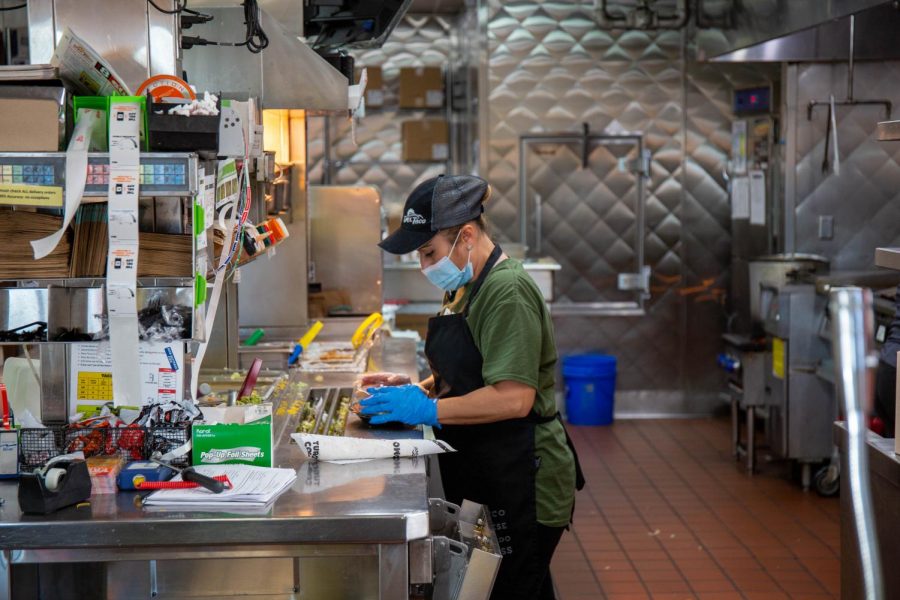Cushman: Quarantining Students Need Financial Relief
Silvia Ocampo prepares drive through orders at Del Taco on 800 E and 400 S in Salt Lake City on Nov. 14, 2020. (Photo by Gwen Christopherson | The Daily Utah Chronicle)
December 2, 2020
As winter approaches and people are trapped inside, the United States is facing another wave of COVID-19. Utah is no exception, with Governor Herbert saying that the state is at “a breaking point.” I recently faced direct exposure. After seeing my parents and having my dad test positive, I immediately went into quarantine to wait out the incubation period before I could get tested. My results came back negative, but I still had to miss five days of work between the time I was exposed and when I received my negative results. When I looked into the requirements for receiving COVID pay, I was surprised to discover that there wasn’t a way for me to earn money for my time in quarantine despite the fact that I was following CDC guidelines. I am incredibly fortunate that I was able to quarantine and still afford to pay my bills, but not everyone has that luxury. In order to seriously address the pandemic, the Utah government needs to make more resources available to Utahns in quarantine.
Utah’s COVID Crisis
If 30 people gather in Utah right now, there is a 24.6% chance that one of them is positive for COVID-19. In Utah County specifically, there is a 53% chance of someone having COVID-19 in a group of 15 people. The rate of positive tests is 18.5%, much higher than the 5% maximum recommended by health organizations earlier in the year. The virus is the third leading cause of death in Utah right now. As college students, we should be especially conscious of these higher case rates because our age group is contracting and transmitting COVID-19 at the highest rates, making us a potential danger to our families as many of us go home for the holidays.
For those of us less at risk from the virus, it can be easy to forget the very real consequences of such high transmission rates. Overwhelmed hospitals, a very real possibility if case rates do not go down, resort to crisis standards of care, making tough choices about who receives the limited amount of medication, attention from staff and other supplies. The reality is that Utah hospitals and ICUs are already very full. If our hospitals reach capacity, that will be a consequence felt by all Utahns. It is important that we lower case rates to ensure that people who need medical attention are able to receive the best possible care when they go to the hospital. It is critical that people are getting tested, quarantining after exposure, and taking precautions to not transmit the virus further.
COVID-19’s Financial Burden
Every American is feeling the economic effects of this pandemic. 72% of Americans are worried about how the pandemic will affect their finances. Many people are having to spend their savings, over 26 million Americans are struggling to get enough to eat, and half of U.S. households are struggling to pay their bills. In Utah, the unemployment rate increased by 16,700 people just from August to September, meaning that 80,000 Utahns are out of work. So many people in our country and our state are struggling financially, making it especially hard to take time off to quarantine after being exposed or testing positive.
The national Department of Labor has created the Families First Coronavirus Response Act (FFCRA), which makes any employee of a company with less than 500 employees eligible for pay for any time they stay home at the recommendation of a healthcare provider. While the FFCRA is a step in the right direction, it has some severe limitations. For example, I was unable to receive compensation during quarantine because the company I work for employs more than 500 people. It also means that those without access to healthcare and those who cannot afford tests are less likely to be able to qualify for pay if they stay home from work. On top of the limitations of the FFCRA, Utah has done little to build on it. One of Utah’s only COVID relief programs is rent relief which is set to end with the beginning of the new year when many Utahns will still be in need of financial aid.
To people who are struggling to make ends meet, taking time off to quarantine or getting tested after being exposed is not feasible. It was something I was only able to afford with the help of my parents. Even with some resources available, quarantining isn’t a luxury that everyone can afford. It needs to become affordable to all of us if we want to combat COVID-19 in our communities.
An Increasing Need
Utahns shouldn’t have to spend all of their savings or ruin their credit to quarantine. We shouldn’t have to choose between our financial security and keeping our communities and families safe. It is time for our state to step up and make it possible for hard-working Utahns to stay home and keep our communities safe when they are exposed to COVID-19. Over the summer as cases surged, Governor Herbert resisted making a state-wide mask mandate but has now had to issue a rule requiring masks across the state. Cases will continue to rise in our state until we make it possible for people to afford to stay home when they are sick or exposed to COVID-19.
The pandemic is more serious than ever, with thousands of new cases in Utah alone every single day. In order to seriously address the pandemic, Utah needs to provide for people struggling financially. Our state needs to make it affordable for people to quarantine and stop the spread. Moving forward, our new legislative leadership and our new governor need to make this a priority.








